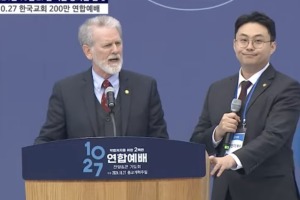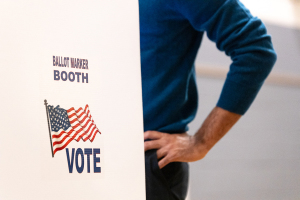World Vision makes $100M commitment to ‘historic’ global water campaign
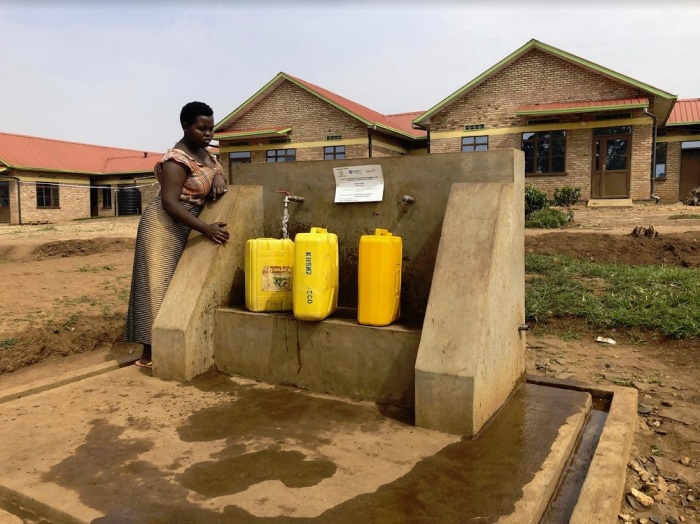
WASHINGTON — World Vision announced a new $100 million commitment as part of a new international campaign to create better conditions for health centers across the globe as millions face increased risk of infection in impoverished nations.
On Wednesday, leaders from humanitarian agencies, religious bodies, financing firms, government entities and universities gathered at the Pan American Health Organization headquarters to announce commitments they are making as part of a new global initiative called "WASH in Health Care Facilities."
The movement, co-sponsored by the Global Health Council and Global Water 2020, seeks to ensure that all health facilities worldwide have access to running water, sanitation and hygiene services (WASH) to prevent people from getting infections and diseases while seeking to improve their health.
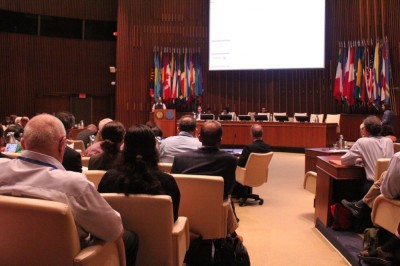
The goal is to ensure half of all health care facilities in each sustainable development goal region has access to WASH infrastructure and services by 2022, 80 percent by 2025 and 100 percent by 2030.
At the stakeholders meeting, at least 73 organizations made varying commitments — from financial contributions and technical support to supervision and advocacy efforts — to do their part to ensure those goals are met.
"We cannot see improvements in maternal and child health, nutrition, and pandemic response or address antimicrobial resistance if WASH services, particularly in clinics and hospitals, remain inadequate," GHC President Loyce Pace said. "This gathering presents the global health and WASH communities with a historic call to action to ensure quality health care services by recognizing the importance of WASH in all facets of our work.”
The new campaign follows a United Nations call to action issued in March 2018 that led to a formal resolution adopted by the World Health Assembly in May with the support of 50 countries and NGOs.
“The passage of this resolution represented the first time that 194 member states of the World Health Organization had joined together to publicly acknowledge this full-blown public health crisis,” said PAHO Chief of Staff Merle J. Lewis in her remarks. “This resolution urged member states to take a number of concrete actions.”
According to a report from the Water Institute at the University of North Carolina, 50 percent of health care facilities in low and middle-income countries lack piped water, while 33 percent lack access to improved sanitation facilities and 66 percent lack access to hand-washing soap and running water.
A recent report from the World Health Organization and the United Nations Children's Fund indicates that about 900 million people are impacted as just one out of eight health care facilities worldwide has no water service.
Additionally, the report estimates that 1.5 billion people are impacted by the fact that one out of five health care facilities in the world has no access to sanitation service.
Newborn babies and mothers are the most vulnerable to suffering from a lack of clean water and sanitation in health facilities.
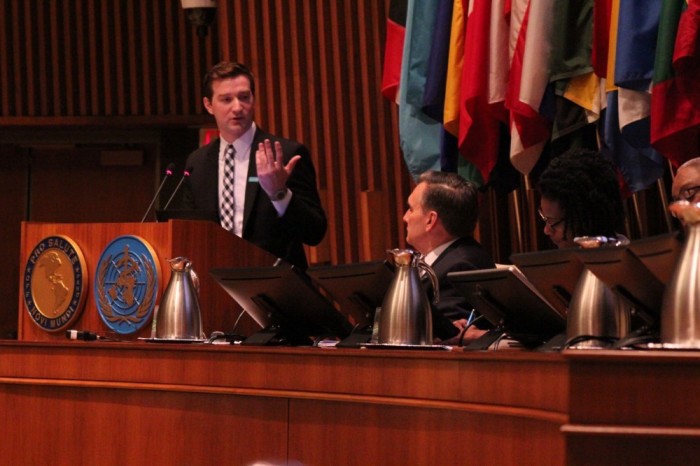
“Health care facilities must be places of healing, not harm,” UNICEF Public Partnerships Manager Sean Snyder said during the meeting. “Seventeen million women give birth in health centers with inadequate water, sanitation, hygiene, which puts them at risk of infection, disease or even death. Many more health seekers risk acquiring infections while during their stays in health care facilities.”
Organizers say the problem is "as serious as it is solvable" because no technological breakthroughs are needed to provide clean water, toilets, sinks in health care facilities.
“It is unacceptable that mothers and newborns continue to face such preventable threats due to lack of WASH services in health care facilities,” Snyder added.
One of the largest efforts announced as part of the new WASH for health care facilities initiative is led by the evangelical humanitarian agency World Vision, which operates in dozens of countries and has worked for years to provide access to clean water in impoverished rural villages worldwide.
World Vision Vice President of Water, Greg Allgood, told those convening for the meeting that World Vision is teaming up with several partners to provide basic water, sanitation, and hygiene services to over 800 rural health care facilities across the globe. World Vision estimates that the effort could cost over $100 million between 2019 and 2021.
According to the charity, those 800 facilities serve an estimated 7.2 million people.
“Our approach is a people-based approach working with community leaders, local, district and national governments, other development partners, corporate partners, and academic institutions,” Allgood explained. “We work with health care personnel. We use WASH Fit. We train the staff on best WASH practices, including waste management. We provide hand-washing spaces where patients are seen.”
Allgood explained that World Vision also ensures women are able to take a shower after giving birth. He added that World Vision works to provide incinerators at health care facilities to help manage medical waste.
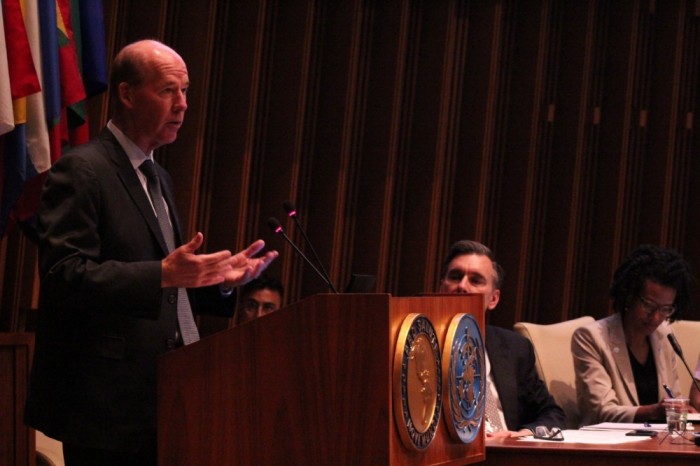
World Vision has long had its own vision to provide clean water and sanitation to every man, woman, and child in each community it serves by 2030.
“[This commitment] follows a series of large commitments that our partners and donors have made,” Allgood said. “By 2030, we will provide everybody with clean water. Our footprint of doing WASH [is] in 35 countries. That means reaching 50 million people by 2030. That is a big goal and it is a long way out. We set an interim goal of reaching 20 million people between 2015 and 2020. We are three years in and we are ahead of schedule. We have reached 12.7 million with clean water.”
Through the WASH initiative, World Vision will partner with the Centers for Disease Control, the Conrad N. Hilton Foundation, the pump manufacturer Grundfos, Golf Fore Africa, the UNC Water Institute, Wells Bring Hope, the Dornsife Family and missionaries Laura and Robert Abernathy.
Some of World Vision’s partners have pledged significant financial resources, while others have committed to providing training, technical guidance, project monitoring and evaluation of the expansion of WASH in health care facilities.
The May 2019 World Health Assembly resolution invited international, regional and local partners to raise the profile of the issue to help strengthen health systems.
According to Jean Duff, president of the Joint Learning Initiative on Faith & Local Communities, almost one-third of the commitments made so far in the WASH for Health Care Facilities initiative have come from faith-based organizations.
In addition to World Vision, commitments were made by groups such as the World Evangelical Alliance, Salvation Army, Catholic Relief Services, the Loyola Foundation, the Adventist Development Relief Agency, IsraAID Global Humanitarian Assistance and a number of Christian associations in Africa.
“In some countries, faith-based organizations are delivering as much as 50 percent of the health care and are very important partners in this WASH work. Faith-based organizations are implementing partnerships with governments,” Duff said.
“The faith community, both at the national and local levels, are building awareness about the challenge of WASH in health care facilities. They leverage private resources, they are building partnerships, and they are leading the way in fixing the WASH in health care facilities deficit.”
Hank Habicht of Global Water 2020, who led Wednesday’s stakeholders' meeting, praised the commitments made by Christian organizations on the ground within Africa.
He said the Africa Christian Health Associations Platform will leverage its convening platform to provide leadership for WASH in health care facilities through its 42 Christian health associations across 32 countries in sub-Saharan Africa.
The Zimbabwe Association of Church-Related Hospitals has committed to engage the Zimbabwe government on the issues of WASH and infection prevention and control.
The Uganda Catholic Medical Bureau has committed to training staff, providing technical supervision and lobbying for WASH using its existing church and coordination structures.
The Christian Health Association of Lesotho committed to installing hand-washing stations and menstrual hygiene facilities, as well as providing advocacy for the development of guidelines and structures at the national level to support WASH.
The Cameroon Baptist Convention Health Services committed to providing technical expertise to its partners and raising funds to harness potable water from available sources.
“Faith-based organizations have multiple roles and multiple capacities when it comes to remedying the deficit of WASH in health care facilities. First and foremost, they have an influence and ability to hold to account their own governments at the local level,” Duff said. “They are delivering health care through their health care facilities and clinics. They are leveraging private resources, to a great extent.”
In addition to faith-based groups, a number of secular institutions and international coalitions have also made significant commitments. More on their commitments can be found here.
Follow Samuel Smith on Twitter: @IamSamSmith
or Facebook: SamuelSmithCP

















